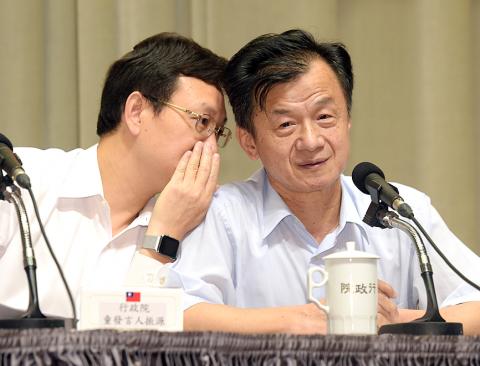A Ministry of Justice agreement to abolish the Special Investigation Division (SID) is based on confidence that the amendment to the Organic Act for Courts (法院組織法) would further empower district prosecutors’ offices and the high prosecutor’s offices to the level that each office would be a literal “mini-SID,” Minister of Justice Chiu Tai-san (邱太三) said yesterday.
The ministry has agreed with Democratic Progressive Party (DPP) Legislator Tsai Yi-yu’s (蔡易餘) proposal to abolish the SID and it is expected to be phased out by October, the Legislative Yuan said.
According to Chiu, the SID had to constantly “borrow” district and high-prosecutor office staff to conduct investigations, adding that there was no need for the SID when district prosecutors are capable of handling investigations into cases of corruption.

Photo: Hunag Yao-cheng, Taipei Times
The SID did not begin prosecution against high-level officials, as minster-level officials were prosecuted prior to the creation of the SID in 2007, Chiu said, adding that the division overshadows other prosecutorial units.
The public should have the same confidence in district prosecutors’ offices as they do in the SID, Chiu said.
Chiu used examples of district prosecutors’ offices and the Agency Against Corruption (AAC) investigating corruption cases in New Taipei City, the former Taoyuan County and Nantou County together.
The ministry will be instructing local prosecutors’ offices to increase efforts to combat corruption, and the draft amendments to the Organic Act for Courts submitted to the legislature will enable those offices to “borrow” staff from other branches should their expertise be required in corruption investigations, Chiu said.
Dissolving the SID should not affect the capability and efficiency of anti-corruption investigations, Chiu said, adding that he has confidence in the district prosecutors’ offices capabilities.
The SID has the power to launch investigations against the president, vice president, presidents of government branches, minister-level officials and generals.
Chiu said that the AAC was also unnecessary, but was motivated by political factors, adding that the AAC has also strained judicial relations due to overlapping jurisdictions.
However, Chinese Nationalist Party (KMT) Legislator Alicia Wang (王育敏) said the DPP was ignoring the rule of law, adding that the establishment of the SID was backed by law and should not be removed on the whim of one administration.
DPP legislators want to remove the SID because it has been responsible for many corruption investigations against former president Chen Shui-bian (陳水扁), Wang said, adding that the motion to abolish the SID is politically motivated.
DPP Legislator Huang Wei-cher (黃偉哲) said the KMT’s comments were purely political, adding that the party has been the beneficiary of the division since its establishment.
The division has investigated members of both parties and the difference is simply whether the investigation proves there is a valid case or not, Chiu said, adding that the ministry is approaching the issue from the point of what function the division serves in maintaining the rule of law.

Alain Robert, known as the "French Spider-Man," praised Alex Honnold as exceptionally well-prepared after the US climber completed a free solo ascent of Taipei 101 yesterday. Robert said Honnold's ascent of the 508m-tall skyscraper in just more than one-and-a-half hours without using safety ropes or equipment was a remarkable achievement. "This is my life," he said in an interview conducted in French, adding that he liked the feeling of being "on the edge of danger." The 63-year-old Frenchman climbed Taipei 101 using ropes in December 2004, taking about four hours to reach the top. On a one-to-10 scale of difficulty, Robert said Taipei 101

A preclearance service to facilitate entry for people traveling to select airports in Japan would be available from Thursday next week to Feb. 25 at Taiwan Taoyuan International Airport, Taoyuan International Airport Corp (TIAC) said on Tuesday. The service was first made available to Taiwanese travelers throughout the winter vacation of 2024 and during the Lunar New Year holiday. In addition to flights to the Japanese cities of Hakodate, Asahikawa, Akita, Sendai, Niigata, Okayama, Takamatsu, Kumamoto and Kagoshima, the service would be available to travelers to Kobe and Oita. The service can be accessed by passengers of 15 flight routes operated by

Taiwanese and US defense groups are collaborating to introduce deployable, semi-autonomous manufacturing systems for drones and components in a boost to the nation’s supply chain resilience. Taiwan’s G-Tech Optroelectronics Corp subsidiary GTOC and the US’ Aerkomm Inc on Friday announced an agreement with fellow US-based Firestorm Lab to adopt the latter’s xCell, a technology featuring 3D printers fitted in 6.1m container units. The systems enable aerial platforms and parts to be produced in high volumes from dispersed nodes capable of rapid redeployment, to minimize the risk of enemy strikes and to meet field requirements, they said. Firestorm chief technology officer Ian Muceus said

MORE FALL: An investigation into one of Xi’s key cronies, part of a broader ‘anti-corruption’ drive, indicates that he might have a deep distrust in the military, an expert said China’s latest military purge underscores systemic risks in its shift from collective leadership to sole rule under Chinese President Xi Jinping (習近平), and could disrupt its chain of command and military capabilities, a national security official said yesterday. If decisionmaking within the Chinese Communist Party has become “irrational” under one-man rule, the Taiwan Strait and the regional situation must be approached with extreme caution, given unforeseen risks, they added. The anonymous official made the remarks as China’s Central Military Commission Vice Chairman Zhang Youxia (張又俠) and Joint Staff Department Chief of Staff Liu Zhenli (劉振立) were reportedly being investigated for suspected “serious